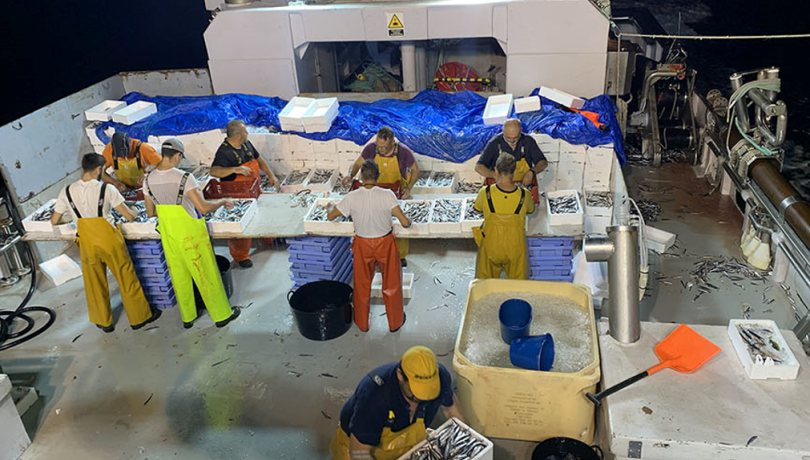This is the main conclusion of a study led by the ICM-CSIC that has applied for the first time a "doughnut" analysis to assess the situation of this activity in the Mediterranean.

A new study led by the Institut de Ciències del Mar (ICM-CSIC) has warned of the environmental and social crisis affecting the purse seine fishing sector in the north-west of the Mediterranean. To carry out this work, a "doughnut" analysis has been applied for the first time. This is a socio-environmental assessment methodology that seeks to facilitate the economic transition to enable human activity to be carried out without exceeding environmental limits while ensuring a minimum level of social welfare for everyone.
Traditionally, the success of an economic sector has been measured primarily through its turnover and capacity for growth. However, the ecological and social crisis of the 21st century has demonstrated the inadequacy of this approach. Faced with this scenario, there is a need to find new indicators and objectives consistent with current problems that adopt a more integrated socio-environmental assessment.
This is the case of the "doughnut" methodology developed in the last decade by economist Kate Raworth. The new approach makes it possible to diagnose the basic features of a post-growth economy where the ultimate goal is to develop economic activities without exceeding environmental limits and simultaneously guaranteeing social minimums.
The “doughnut” methodology gets its name from its structure. It consists of two concentric rings: the interior represents the social basis of basic needs, derived from the social priorities of the Sustainable Development Goals, which guarantees the essentials for living; The exterior is the ecological roof, marked by planetary boundaries. The donut-shaped area between the two boundaries is the ecologically safe and socially just space to which societies should aspire, serving as an alternative to the economic goal oriented towards GDP growth.
"Facing new challenges, we need new perspectives and new objectives. The doughnut approach gives us a simple yet comprehensive view of the main environmental and social challenges and objectives that we need to address. Moreover, because it is a generalist framework, it allows us to open our eyes, to dialogue with other economic sectors that are also undergoing transformation and to learn from each other," says the study's lead author, Miquel Ortega.
Until now, the conceptual framework had been applied at the global and state level, but never in the field of the blue economy, a booming sector. In fact, the growing interest in this sector is reflected in the new European blue economy strategy "Transforming the EU's Blue Economy for Sustainable Future", which establishes the need to shift the focus from "blue growth" to a sustainable blue economy.
The purse seine situation in Catalonia
The new study, recently published in the journal Ecology and society, comprehensively assesses a sector of the blue economy that is going through particularly difficult times, the purse seine fishery in the northwest Mediterranean Sea.
The analysis highlights several areas of ecological overexploitation and failure to meet basic social needs, bringing to the table a situation that is far from being considered environmentally safe and socially fair. According to the work, the transition to a sustainable sector is not simply a technical or financial issue, but also requires social capacities to lead the process, without neglecting the social context.
The results of the assessment highlight the "urgent need" for a global transition plan that includes an ecosystem-based approach to fisheries management, as well as commercial and social action plans. The study also shows that this approach can be key to achieving sustainable fisheries and contribute to broader discussions on the socio-economic and ecological changes needed for a sustainable and climate-resilient blue economy.
"Reducing the overexploitation of species such as anchovy caught by purse seine is basic, but not enough to ensure the viability of the sector in the Mediterranean. A more integrated management of the ecosystem is necessary, including factors such as the effects of other fleets on juveniles of small pelagics or climate change. In addition, mechanisms should be put in place to make the sector more competitive, to improve marketing and make it more attractive to young people and women. We need urgent action because every day that goes by we are losing the capacity to make the transition," emphasizes Francisco Ramírez, co-author of the study.
Finally, the analysis highlights that the use of this non-fisheries-specific framework can facilitate the engagement of fisheries expertise in broader discussions about the socioeconomic and ecological changes needed to achieve a sustainable blue economy.
"There is increasing interest in doing more economic activities at sea, but the sea is not infinite, it is not an endless cornucopia, a source of infinite riches for all. What we have we must manage according to social priorities, beyond continuous growth which is impossible. The doughnut perspective can help us establish priorities and have shared visions of where we want to go," concludes Marta Coll, another of the study's co-authors.